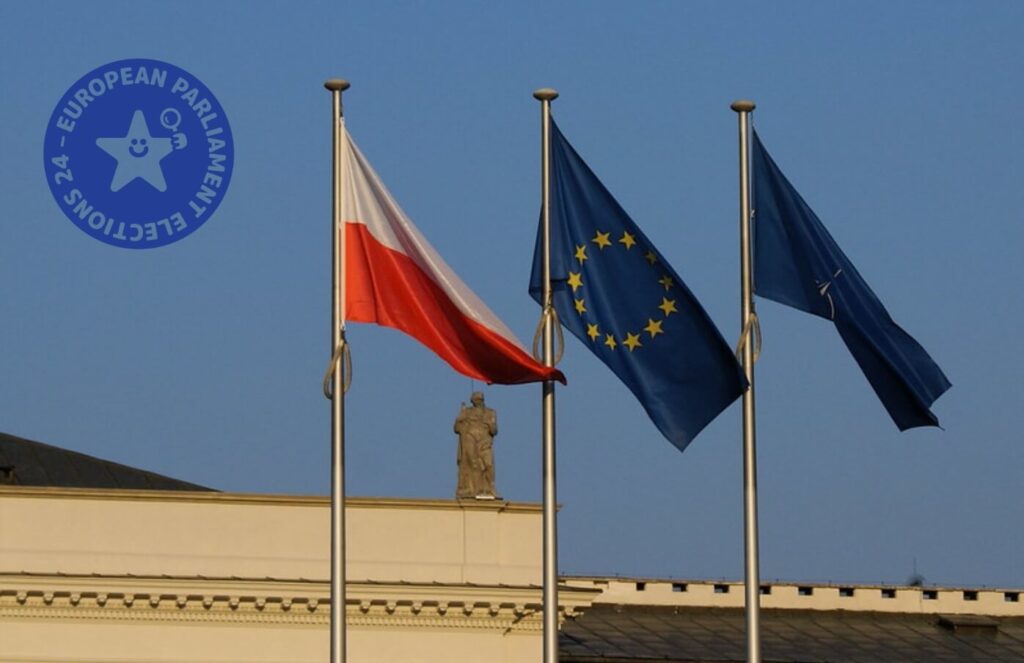
Ahead of the European Parliament elections scheduled for June 2024, the Polish left is as weak as it has never been. Neo-liberals and national populists will compete for election victory, with other political options far behind.
Balance of power
At the end of 2023, the rule of the national populists from Law and Justice (and their smaller right-wing coalition partners) came to an end in Poland after eight years. A coalition of the neoliberal Civic Platform, the conservative-liberal Third Way (which is itself a coalition of the conservative-peasant PSL and the liberal Poland 2050) and the social-democratic New Left took power. Law and Justice, although it obtained the highest electoral result, found itself in opposition. The composition of parliament is completed by the far-right Confederation. Left-wing organisations to the left of social democracy have very little visibility in Poland and their activities did not play the slightest role during the election campaign and after the elections. The most left-wing members of the Polish parliament are the 7 members of the Razem party, which forms a joint parliamentary club with the New Left and critically supports the government, even though it did not enter it – due to the Civic Platform‘s rejection of key social demands, including in the area of housing.
It is a feature of Polish political life that the political conflict is highly polarised and dominated by the rivalry between Law and Justice (in the European Parliament – part of the ECR faction) and Civic Platform (in the EPP in the European Parliament) with allies that include, of their own volition, the social democrats from the New Left (in the European Parliament – the Socialists and Democrats faction). In practice, this means that Polish citizens have a choice of either voting for national conservatives who, tactically, raise the minimum wages or introduce pro-family financial support measures deemed unthinkable by their neo-liberal rivals, or supporting neo-liberals who declare an understanding of gender equality or LGBT demands and guarantee a rule of law, but systematically reject any social policies and constantly insist on supporting business, turning a blind eye to inequalities or poverty issues. Both major parties are united by their agreement on migration policy (opposition to the acceptance of refugees, acceptance of the mass arrival of foreign workers) and compliance with capitalism as the only recognised economic system. The extreme pro-business policies of Civic Platform, in particular, are reminiscent of the neo-liberal wave of the 1980s and 1990s in this regard.
Attempts, in recent years, to build political movements outside these major parties have ended in failure and the co-optation of ”alternative” parties into one of the two camps. The only party that has not joined any camp is the far-right Confederation, which combines conservatism and Catholicism with economic laissez-faire. The social-democratic New Left, having tried to appear as a third force in 2019, now unconditionally supports the Civic Platform government and does not oppose in practice its neoliberal economic policies. Its activists are more engaged in the fight for women’s or LGBT rights, but here, too, their effectiveness is limited and the moderate variants of the demands put forward are taken over by Civic Platform. In the regional elections in April 2024, the New Left received just over 6 per cent of the vote, its worst result in years, which raises serious questions about the prospects of even a moderate left in Poland.
Euroscepticism on an upward wave
Until recently, support for Poland’s membership in the European Union was a common attitude regardless of divisions on other issues. On the other hand, Polish citizens seemed to appreciate mainly the benefits obtained by Poland through membership (support for agriculture, opening of borders) rather than perceiving a united Europe as a long-term political project, a community of values.
This state of affairs changed at the end of the Law and Justice government, which introduced a very strong anti-EU stance into public discourse. It was during the party’s rule that leading politicians suggested that the EU was taking away Poland’s sovereignty, interfering in economic affairs, imposing the acceptance of migrants, and striking at Polish identity by promoting LGBT-rights. As a result, in the spring of 2023, for the first time in a nationwide poll, the number of people fearing the impact of the Union on Polish sovereignty was slightly higher than the number of Euro-enthusiasts. By contrast, in March 2024, in another poll, as many as 20% of respondents were in favour of leaving the Union, while 62% wanted to remain. Anti-EU slogans are also a pillar of the programme of the far-right Confederation (> 7% support in regional elections), and they resounded strongly during recent farmers’ protests. In contrast, the Civic Platform, the Social Democrats and the Third Way, followed by their voters, are unequivocally pro-European and view the European Union almost uncritically.
As the campaign for the regional elections in Poland was still ongoing until recently (the first round took place on 7 April), polls on the EP-elections are scarce. However, those that have been published confirm the general trend in Polish politics. According to a Research Partner survey from March 2024 30.2% of citizens wanted to support the candidates of Civic Platform, and 29.1% those of Law and Justice. The Third Way, the New Left and the Confederation scored between 8% and 9%. On the other hand, in a survey by the Opinia 24 studio carried out at the end of February, Civic Platform won with a score of 33.5% ahead of Law and Justice with 29%. In this survey, 14% of the respondents favoured the Third Way. The results of the New Left and the Confederation were estimated at 8.5% and 7.5% respectively.
One can assume that, influenced by the regional elections, these forecasts are due for revision. Some liberal commentators expected a rapid disintegration of Law and Justice after the defeat in 2023. However, the regional elections proved that the party – despite internal divisions – did not lose its wide electoral base among older voters (50+), people living in the villages, as well as small and middle towns. In fact, Law and Justice was able to mobilise voters more effectively than the parties in the government. Once again, it was Law and Justice that proved to be the single party with the greatest support.
While the Civic Platform, the Third Way and the New Left keep working together nationally, they are not going to form a joint list for the European elections. On one hand, this is a natural consequence of their different affiliations in Europe (EPP, Renew Europe and S&D), as well as of the reluctance of Platform’s leader, Donald Tusk, to share list seats with coalition partners. Ultimately, he aims to absorb his competitors and perpetuate the polarisation of the Polish political scene.
Sluggish campaign
As regional elections were taking place in Poland in April 2024, with a second round planned in some cities (municipal elections), the campaign for the European elections is only slowly gaining momentum as of the end of April. In the media sphere, so far there have only been articles warning of the rise of the extreme right across the continent before the upcoming elections, or pointing to Russian propaganda as a threat to the electoral process and democracy in Europe. This was loudly echoed by the Czech service’s announcement in March 2024 that it had broken up the Russian network that ran the Voice of Europe portal, which gave voice to Eurosceptics and the far right from many countries. One of the people involved in the portal was a Polish citizen, and there was speculation in the media as to whether the Polish far right was receiving financial support directly from Russia.
It can be expected that the election campaign, when it starts, will be based on similar slogans or conflict lines as the campaign for the national elections in 2023 – with even more verbal brutality. Civic Platform will present itself as the party that guarantees Poles’ freedom, the rule of law, human rights, a firm sense of belonging to the West (understood as the highest civilizational choice, and strongly opposed to the ˮbarbaric” and ”authoritarian” East), an important role in the European Union, modernity, but also security against a potential Russian attack (thanks to integration into the West and an alliance with the United States). On the side of Law and Justice, slogans such as the dignity of Poland and the Polish nation, defence of the national interest in Europe, sovereignty, tradition, justice will play a key role. In addition, Law and Justice seems to be willing to exploit the growing Eurosceptical sentiments. Inaugurating the European campaign on 27 April, the party’s leader Jarosław Kaczyński announced that the party’s candidates, once elected, would stop the European Green Deal and resist to ‘madness of climate policy’. Other key promises of Law and Justice include rejection of the migration pact (on the grounds of not allowing any ‘illegal people’ into Poland) and resistance to the idea of European federalism, which, in the party’s rhetoric, would mean surrendering Poland’s independence to Germany.
The New Left officially launched their campaign on 26 April, presenting, on the contrary, a general pro-European message, focusing specifically on the issue of women’s rights (as women are an important group of the party’s voters), suggesting that thanks to Poland’s presence in the EU, Polish female citizens will one day enjoy the same living and rights’ standards as women in the other European countries. MEP Robert Biedroń (S&D), one of the party’s co-leaders, also hinted at Europe as a community of social values, which would ultimately guarantee the same wages and living standards to people in all the member states. While there is nothing categorically wrong in the Social-Democrats’ discourse, it is also difficult to claim that they have any kind of fresh and captivating vision, or energy comparable to the militancy of the right and far-right parties. In addition, despite relatively high interest for left-wing thought among the younger voters, the party again offered the best places on its electoral lists to old generation politicians, who became known for their participation in neo-liberal reforms in 2000s Poland rather than for any egalitarian policies.
European Parliament elections have always attracted the least interest of all elections in Poland. Politicians also treat them as rather an opportunity to gain well-paid positions and to symbolically prove their superiority over their opponent. This seems to be the primary aim of Donald Tusk, who included a dozen of ministers in the Civic Platform’s electoral lists, just to assure that popular names would secure a considerable number of votes. The reflection on how the work of the European Parliament translates into the situation of respective societies, how politicians could work transnationally and what positive things can be done in this forum was practically absent in previous election campaigns. Unfortunately, there is no indication that this time will be any different.
Cover-Photo: alex.ch via Flickr.



